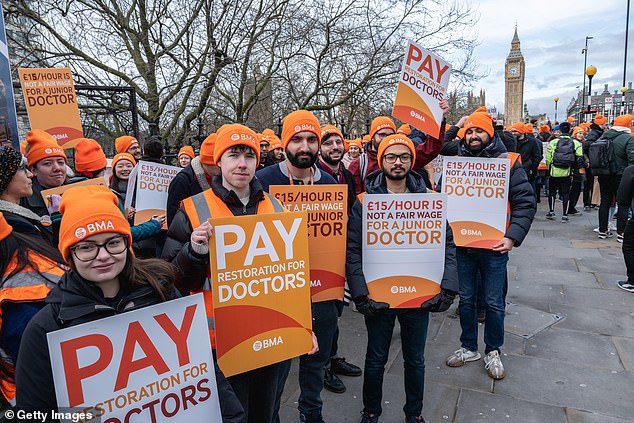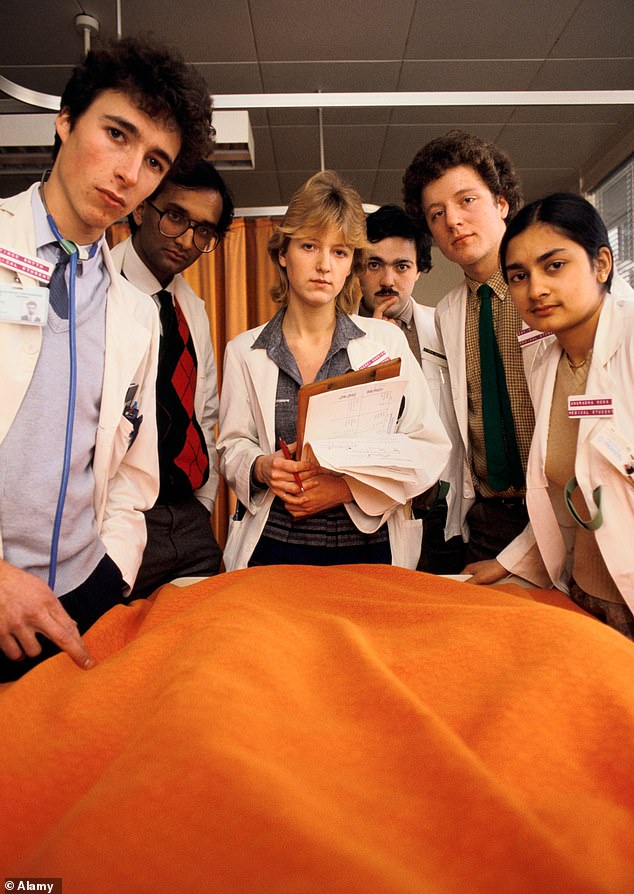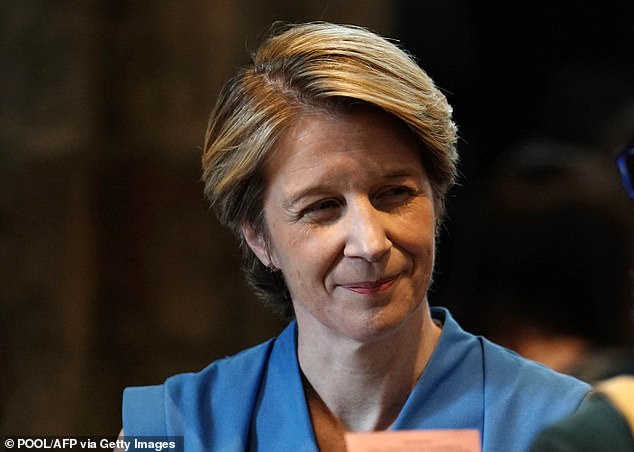Unless there is a dramatic change in events, this Thursday will be the start of the eleventh round of strikes by junior doctors.
The lack of resolution is detrimental to everyone and there doesn’t seem to be an end in sight; In fact, the resolve of young doctors is hardening: 98 percent supported new strikes in the last vote.
Yes, strikes are about wages. But it is also about conditions: you only have to consider the endless stories of young doctors who left in search of “better lives” in Australia to realize this.
And as well as resolving pay issues, what will also make a real difference is how young doctors are classified.
I know this because at my hospital in Brighton young doctors don’t go abroad, they join us.
Professor Rob Galloway (pictured) argues that the way to resolve junior doctors’ strikes is through a more flexible rotation system

Young doctors’ resolve is hardening: 98 percent back new strikes in latest vote (file image)

Young doctors attend their picket at St Thomas’ Hospital in Westminster on February 26, 2024.
We are not paying them more, we cannot, that is a national decision. And it’s not about giving them special treatment instead of providing the best possible patient care.
It’s about our rotation system; Please be patient, this is not a human resources lesson, but something that makes a difference for patients.
Currently, young doctors are often not told where they will work until a few weeks before they start work. And even then, they are often treated as shift “fodder,” put on continuous shifts of weekends and endless nights, with no thought to the needs of their own lives.
This is what happened to me when I was a junior: I missed one of my best friends’ wedding. Boo-hoo, you might say.
But I know young doctors who have been hired to work the night of their wedding day, or who have been unable to take vacations with their children during the school holidays and have instead been told to arrange their own exchanges with a colleague. , if you can find one to do this.
This is not an urban myth, but the reality of an unacceptable way of managing staff. These highly trained young doctors often leave medicine altogether or work as doctors abroad.
The result is that patients suffer, doctors suffer, and billions are wasted in agency fees.
At my hospital we have developed a new way of managing our staff that is transformative.

Medical students in training tour the wards of a university hospital

Members of the junior doctors committee who are in dispute with the government over pay agreements carried out their tenth strike in a year on February 26.
The number of hours each doctor needs to work in each rotation is calculated (younger doctors typically work four to 12 months in a specific area, such as emergency medicine, before rotating to another specialty), and then they work those hours in that rotation.
They can choose when they will not work before the rotation takes place.
With the rotation compiled eight weeks before starting their job, it means they need to be organized in planning their holiday, but then they will have the work-life balance they want.
As long as we can cover the necessary shifts, they are allowed to be free whenever they want. And if requests were made after the rotations were compiled, the rotation teams are there to help as needed.
After we introduced this scheme in 2016, we had a junior doctor who only worked every other weekend and occasionally full weeks due to childcare commitments.
Without our flexible rotation, I would have left the NHS. But she worked part-time (knowing the hours she was committed to) for three years, before continuing with her formal training. She now works as a family doctor.
Many others, who would normally have left the NHS and worked as agency doctors, continued to work for us an average of 18 hours a week.
They could go on a trip for a few months and then return full time for a few months, all within their contracted hours.
This is all just common sense. But the main obstacle to implementing these ideas was that the standard NHS shift system, which most hospitals use, is not designed for this degree of flexibility.
So when I was managing our departmental rotations, I ignored the rules and collaborated with an independent group of computer geniuses who created a new system called healthrota.
The system, which uses algorithms and sound thinking, helped create shifts that worked for staff (and patients) and with fewer gaps in coverage, thereby reducing costly substitute costs.

Young doctors hold placards as they picket outside St Thomas’ Hospital in Westminster in London, Monday March 13, 2023.

In April, NHS chief executive Amanda Pritchard wrote to hospital leaders telling them they needed to “improve shift management”.
We then went on to implement this for all doctors in the trust where I work – this system has now won multiple awards, has had scientific papers demonstrating its effectiveness and has been shown by the NHS as a vanguard of good practice.
In April, NHS chief executive Amanda Pritchard wrote to hospital leaders saying they needed to: “improve shift management by exploring the opportunities technology offers to move towards greater self-management, so doctors have greater control over their lives while meeting the needs of the service.”
But the bad news is that most hospitals are not adopting this new way of working.
And the NHS team which, in recent years, has been helping hospitals adopt new ways of recruiting staff, was disbanded last year.
Unless this is resolved, even if the pay dispute is resolved, I don’t think we will solve our young doctor crisis. And once again, ultimately it is the patients who will lose out.


